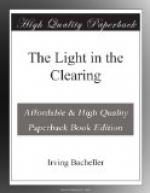“Yes,” I answered.
“No ye can’t, nuther—leastways if ye can ye’ve got better eyes’n mos’ people, ye can’t see only a patch o’ the roof an’ one chimney—them pine trees bein’ thicker’n the hair on a dog. It’s the gloomiest ol’ house in all creation, I guess. Wal, that’s the Squire Fullerton place—he’s Kate’s father.”
“Does the squire live there?”
“No, sir—not eggzac’ly. He’s dyin’ there—been dyin’ there fer two year er more. By gosh! It’s wonderful how hard ’tis fer some folks to quit breathin’. Say, be you any o’ his fam’ly?”
“No.”
“Nor no friend o’ his?”
“No!”
“Course not. He never had a friend in his life—too mean! He’s too mean to die, mister—too mean fer hell an’ I wouldn’t wonder—honest, I wouldn’t—mebbe that’s why God is keepin’ him here—jest to meller him up a little. Say, mister, be you in a hurry?”
“No.”
“Yis ye be. Everybody’s in a hurry—seems to me—since we got steam power in the country. Say, hitch yer hoss an’ come in here. I want to show ye suthin’.”
He seemed to enjoy contradicting me.
“Nobody seems in a hurry in this town,” I said.
“Don’t, hey? Wal, ye ought to ‘a’ seen Deacon Norton run when some punkins on his side hill bu’st their vines an’ come rollin’ down an’ chased him half a mile into the valley.”
I dismounted and hitched my horse to the fence and followed him into the old churchyard, between weather-stained mossy headstones and graves overgrown with wild roses. Near the far end of these thick-sown acres he stopped.
“Here’s where the buryin’ begun,” said my guide. “The first hole in the hill was dug for a Fullerton.”
There were many small monuments and slabs of marble—some spotted with lichens and all in commemoration of departed Fullertons.
“Say, look a’ that,” said my guide as he pulled aside the stem of a leafy brier red with roses. “Jest read that, mister.”
My keen eyes slowly spelled out the time-worn words on a slab of stained marble:
Sacred to the memory
of
Katherine Fullerton
1787-1806
“Proclaim his
Word in every place
That they are dead who
fall from grace.”
A dark shadow fell upon the house of my soul and I heard a loud rapping at its door which confused me until, looking out, I saw the strange truth of the matter. Rose leaves and blossoms seemed to be trying to hide it with their beauty, but in vain.
“I understand,” I said.
“No ye don’t. Leastways I don’t believe ye do—not correct. Squire Fullerton dug a grave here an’ had an empty coffin put into it away back in 1806. It means that he wanted everybody to understan’ that his girl was jest the same as dead to him an’ to God. Say, he knew all about God’s wishes—that man. Gosh! He has sent more folks to hell than there are in it, I guess. Say, mister, do ye know why he sent her there?”




